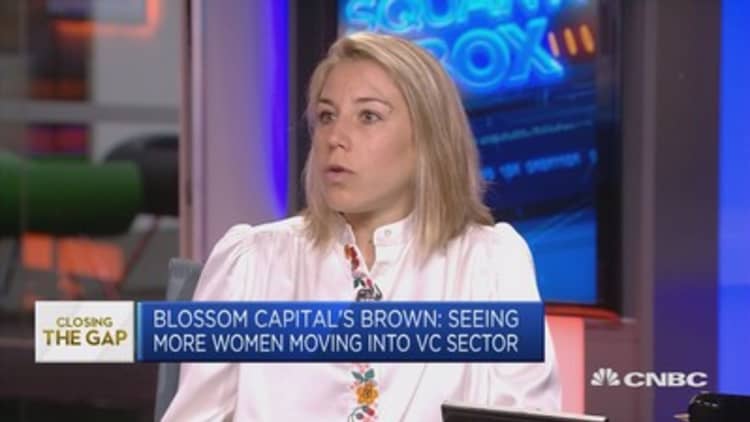For many women in venture capital, there's no question the industry has a gender disparity problem.
Venture capital, or VC, partnerships "have historically been built by men," investor Ophelia Brown tells CNBC.
VC companies consist of general partners, who manage funds and advise on investment decisions, and limited partners, who give them the capital to work with.
That trend of male-dominated funds hasn't budged much. Female partners are still a minority — 9 percent, to be exact — and most of the VC dollars are going into male-founded start-ups.
In Europe, for example, research by tech investment firm Atomico shows that 93 percent of venture money went to start-ups with all-male founding teams last year.
"The challenge is, building a partnership is an incredibly delicate thing," Brown, formerly of Index Ventures, says. For context, Index Ventures has made a number of notable Silicon Valley exits — from Facebook to, more recently, Dropbox.
Brown now manages a fund called Blossom Capital, which is focused on Europe's start-up scene. Blossom, founded in 2016, recently closed an $85 million fund dedicated to pouring cash into proven early-stage start-ups.
When it comes to gender equality, one main hurdle for the industry to overcome, Brown says, is finding the limited partners necessary to back female-founded venture teams.

A solution? Limited partners need to take more risks and pluck up the courage to back new female-focused funds, according to Brown. Limited partners are usually high net-worth-individuals and institutions — many of which are overwhelmingly male — so there needs to be more women who are putting money on the table, she says.
"I would say there are a lot of female-focused initiatives that actually come short because they say they're reserving pockets for women but don't," she says. "And it's kind of like, well how do you get women into partnerships if you're still going to be quite risk averse in your capital provision?"
Brown's logic being that, without enough investment players willing to contribute to female-led venture funds, women may be discouraged from entering the industry altogether.
In her own experience, Brown says she's noticed "a lot of bias" in favor of male-led teams on the institutional side of the VC market. Institutional investors include pension funds, endowments and funds of funds.
Suzanne Ashman, a partner at seed investment firm LocalGlobe, says she's not seen "any bias" against women from limited partners, but agrees "they are pretty much exclusively male."
"There are few female LPs in venture funds," she says. "That in and of itself is a challenge." Although, Ashman adds LocalGlobe has been "fortunate enough to work with a couple."
For Brown's part, she says she's been "very fortunate" to raise money from LPs that back Blossom Capital "because they want to maximize their returns." But there's more to be done to promote women in the industry and raise them through the ranks, she adds.
LocalGlobe's Ashman agrees. "Some progress" has been made, but "certainly not enough." There are a number of other challenges to solve before getting anywhere close to gender diversity in the industry, she says.
"You've got too few female founders, too few women within tech companies that have meaningful equity, too few female angel investors... and there aren't enough women in decision-making roles," Ashman says.
"I think the next step for how we see more women in decision-making roles in venture funds is: make sure your entry level hires are diverse, and be more open to the kinds of backgrounds and profiles you're going to look for."


